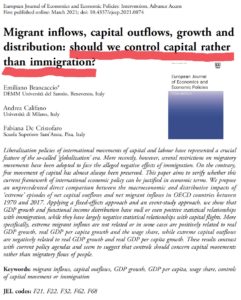EJEEP – European Journal of Economics and Economic Policies. Intervention
Published in Print: March 2021 – DOI: 10.4337/ejeep.2021.0074
Emiliano Brancaccio, Andrea Califano, Fabiana De Cristofaro *
Abstract. Liberalization policies of international movements of capital and labour have represented a crucial feature of the so-called “globalization” era. More recently, however, several restrictions on migratory movements have been adopted to face the alleged negative effects of immigration. On the contrary, free movement of capital has almost always been preserved. This paper aims at verifying whether this current framework of international economic policy can be justified in economic terms. We propose an unprecedented direct comparison between the macroeconomic and distributive impacts of “extreme” episodes of net capital outflows and net migrant inflows in OECD countries between 1970 and 2016. Applying a fixed effects approach and an event-study approach, we show that GDP growth and functional income distribution have null or even positive statistical relationships with immigration, while they have largely negative statistical relationships with capital flights. More specifically, extreme migrant inflows are not related or in some cases positively related with real GDP growth, real GDP per capita growth and the wage share, while extreme capital outflows are negatively related with real GDP growth and real GDP per capita growth. These results contrast with current policy agendas and seem to suggest that controls should concern capital movements rather than migratory flows of people.
JEL classification: F21, F22, F32, F62, F68.
Keywords: migrant inflows, capital outflows, GDP growth, GDP per capita, wage share, controls of capital movement or immigration.
* Emiliano Brancaccio (Università del Sannio, Benevento, Italy). Andrea Califano (Università di Milano, Italy), Fabiana De Cristofaro (Scuola Superiore Sant’Anna, Pisa, Italy). We would like to thank Eduardo A. Cavallo, Giorgio Fagiolo, Gennaro Zezza and two anonymous reviewers for their useful comments and suggestions. The usual discalimers apply.
EXCERPTS/STRALCI
“[…] Often justified by the idea that uncontrolled immigration adversely affects sustainable development, economic growth and income distribution, various restrictions on the inflows of people from abroad have been adopted. However, none of this happened on the side of financial flows. Despite frequent turmoil in international capital movements, often in concomitance with slowdowns in economic activity, there has hardly been any political action towards restoring controls on the free circulation of capital. Moreover, this asymmetric political reaction to migratory and capital movements does not seem to have been altered by the crisis triggered by the coronavirus: in fact, to some extent, it seems to have been accentuated. After a long phase of hegemony of the so-called neoliberalism and a related doctrine of laissez-faire applied more or less indiscriminately to all markets, today a more sophisticated ideological structure of international relations seems to assume historical relevance. In general terms, it is sometimes referred to as “neoliberal nationalism” but in a more specific sense it could be defined as a more or less surreptitious form of “xenophobic neoliberalism”. […] The sharp asymmetry in the political attitude towards movements of capital and movements of people represents one of the most distinctive elements of this new international order. The key issue, however, is that such an asymmetry does not find support in scientific evidence. […]”
“[…] Spesso giustificato dall’idea che un’immigrazione incontrollata incida negativamente sulla crescita e sulla distribuzione del reddito, sono state adottate varie restrizioni agli afflussi di persone dall’estero. Tuttavia, nulla di tutto questo è avvenuto sul lato dei flussi finanziari. Nonostante frequenti turbolenze nei movimenti internazionali di capitali e concomitanti rallentamenti dell’attività economica, non c’è stata quasi nessuna azione politica per ripristinare controlli sulla libera circolazione dei capitali. Questa tipica reazione politica asimmetrica ai movimenti migratori e di capitali non sembra essere stata alterata dalla crisi innescata dal coronavirus: anzi, per certi versi sembra essersi accentuata. […] Dopo una lunga fase di egemonia del cosiddetto ‘neoliberismo’ e di una dottrina del laissez-faire applicata più o meno indiscriminatamente a tutti i mercati, una nuova e più sofisticata struttura ideologica delle relazioni internazionali sembra imporsi sulla scena storica. In termini generali, questa nuova fase è stata etichettata come ‘nazionalismo neoliberista’ ma in senso più specifico potrebbe essere definita come una forma più o meno surrettizia di ‘neoliberismo xenofobo’. […] Questa marcata asimmetria nella politica economica, che lascia libertà di movimento ai capitali mentre blocca i movimenti di persone, rappresenta uno degli elementi distintivi del nuovo ordine internazionale. La questione chiave, tuttavia, è che tale asimmetria non trova supporto nell’evidenza scientifica. […]”
